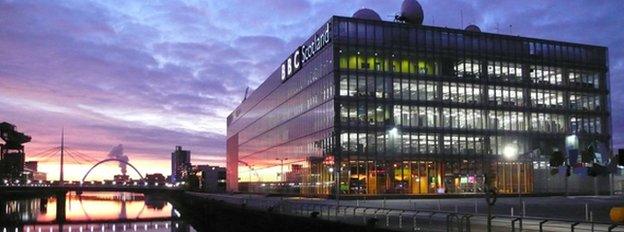Scotland's referendum: What are the issues around broadcasting?
- Published
The question of what will happen to broadcasting in the event of Scottish independence is a topic being debated in the referendum.
The pro-independence campaign says a publicly-funded Scottish Broadcasting Service would be created to provide TV, radio and online services. The pro-Union camp believes without the current British Broadcasting Corporation (BBC) programmes would be lost and costs would increase.
Here, we bring together the main stories, explainers and official documents covering the issue.

What's the current set-up?

The BBC operates throughout the whole UK and the Westminster government oversees rules relating to broadcasting. The current licence fee stands at £145.50 annually and BBC Scotland has a budget of about £200m per year.
Find out more....

What could change post-Yes?
The Scottish government's White Paper on independence says a publicly-funded Scottish Broadcasting Service, providing TV, radio and online services, would be established and work with the BBC in a joint venture. It suggests the licence fee would be the same as in the rest of the UK, and all current licence fee payment exemptions and concessions would be retained. The paper adds that existing licences for broadcasters in Scotland will be fully honoured.

What do the pro-Union parties have to say?
The pro-Union Better Together campaign believes independence would lead to the loss of popular BBC programmes or result in households paying more for big sporting events and dramas. It reckons viewers in Scotland currently get a distinctive broadcasting service and world-class programmes from the BBC.

Who is saying what, including you?
Politicians, academics and industry experts have had much to say about the current broadcasting set-up and what might happen to it in the event of a "Yes" vote.
Find out more.....
Broadcasting

Big reading - reports in full
White Paper Chapter 9 Culture, Communications and Digital, external
UK public bodies that serve Scotland (UK government), external
... and for more reading on the referendum debate click through the BBC's Referendum library